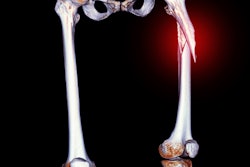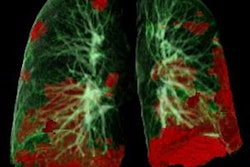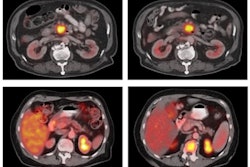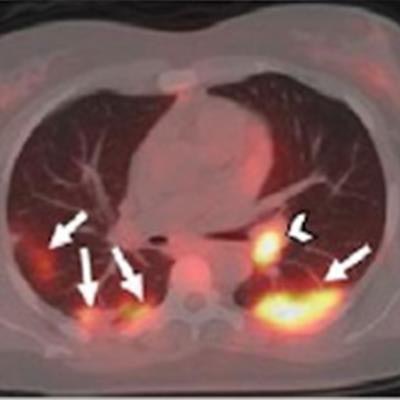
FDG-PET/CT imaging in patients diagnosed with COVID-19 is associated with a higher risk of symptomatic infection and hospitalization, which may help predict disease severity, according to a study published August 8 in Clinical Imaging.
Researchers in New York City analyzed imaging from patients with confirmed COVID-19 infection who underwent FDG-PET/CT scans for routine cancer care. They found patients with positive signs of COVID-19 infection on FDG-PET/CT had more severe infections compared with patients with negative scans.
"A positive PET scan is associated with higher risk of symptomatic infection and hospitalizations, which may be helpful in predicting disease severity," wrote Dr. Randy Yeh and colleagues at Memorial Sloan Kettering Cancer Center.
FDG-PET has emerged in recent years as a noninvasive tool for diagnosing and monitoring infectious diseases. Since cancer patients are more susceptible to infection and mortality from COVID-19, the researchers sought to evaluate FDG-PET/CT for detecting rates of COVID-19 in a group of cancer patients during the peak of the pandemic in New York City.
In a retrospective investigation, Yeh and colleagues evaluated 31 cancer patients with laboratory-confirmed COVID-19 who underwent routine oncological FDG PET/CT imaging between March 1 and April 30, 2020. All patients had positive COVID-19 nasal swab tests using real-time reverse transcription polymerase chain reaction (RT-PCR).
Patients underwent FDG-PET/CT up to two weeks before a positive RT-PCR test or at any time after a positive RT-PCR within the study period. The mean patient age was 57 years, and a majority were male (68%). PET/CT images were reviewed by nuclear medicine specialists for abnormal PET/CT findings typical for COVID-19 as described in prior studies.
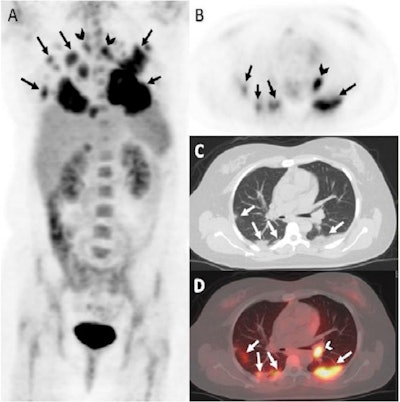 A 60-year-old woman with metastatic lung cancer who underwent FDG-PET/CT for radiation therapy planning. The patient reported muscle aches and headache and had a positive COVID-19 RT-PCR test on the same day of the PET/CT. FDG-PET maximum intensity projection (MIP) image (A) and axial PET, CT, and fusion PET/CT images (B-D) demonstrated newly detected FDG-avid bilateral opacities and consolidation, predominantly subpleural in location (arrows). The hottest opacity was in the left lower lobe with SUVmax of 11.5. FDG-avid hilar lymph nodes are also identified (arrowheads), with SUVmax of 6.2. Image courtesy of Clinical Imaging.
A 60-year-old woman with metastatic lung cancer who underwent FDG-PET/CT for radiation therapy planning. The patient reported muscle aches and headache and had a positive COVID-19 RT-PCR test on the same day of the PET/CT. FDG-PET maximum intensity projection (MIP) image (A) and axial PET, CT, and fusion PET/CT images (B-D) demonstrated newly detected FDG-avid bilateral opacities and consolidation, predominantly subpleural in location (arrows). The hottest opacity was in the left lower lobe with SUVmax of 11.5. FDG-avid hilar lymph nodes are also identified (arrowheads), with SUVmax of 6.2. Image courtesy of Clinical Imaging.The researchers found 13 of 31 patients (41.9%) had positive PET/CT scans. Patients with positive scans had significantly higher rates of symptomatic COVID-19 infection (77% vs. 28%) and hospitalizations (46% vs. 0%) compared with patients with negative PET/CT scans.
Of the patients with positive scans, 11 out of 13 (84.6%) had FDG-avid lung findings, with mean lung SUVmax of 5.36; 6 of 13 patients (46.2%) had extrapulmonary findings of FDG-avid thoracic lymph nodes.
The authors noted limitations, namely that the study may have included patients with more severe illness, either due to COVID-19 or their underlying cancer. Nonetheless, the study included thus far the largest group of patients with confirmed COVID-19 infection who have undergone FDG PET/CT imaging, they wrote.
"Patients with positive FDG scans were more likely to have symptomatic COVID-19 infection and be hospitalized, suggesting that the presence of PET/CT findings is associated with the severity of COVID-19 infection," the researchers concluded.






